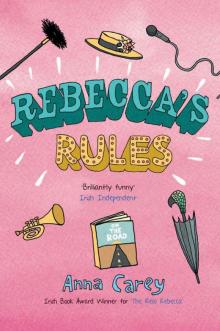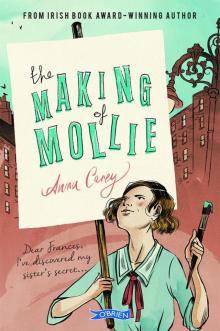- Home
- Anna Carey
Once: An Eve Novel Page 2
Once: An Eve Novel Read online
Page 2
When he was less than two hundred yards away he stopped to rest beside a car. He squinted at the hillside, searching for signs of life. We crouched further down behind the ledge, but the man didn’t look away. “He sees us,” Harriet hissed, her cheek pressed against the stone. The man reached into his knapsack and pulled something out.
“Is it a weapon?” Isis asked.
“I can’t tell,” Maeve replied. Isis moved her finger, resting it lightly on the trigger.
The man stalked forward, a new resolve in him, and Quinn aimed her gun. “Stop!” she yelled out to him, keeping low so he couldn’t see her behind the ledge. “Do not go any further!” But the man was running now. The dog was right beside him, its thick black body heaving with the effort.
Maeve inched forward, whispering in Quinn’s ear. “Don’t let him get off the bridge. No matter what.”
Her eyes betrayed no feeling. The day I came across the bridge with Caleb, we were unbearably tired, the past weeks weighing us down, making every step difficult. His pant leg was soaked through with blood, the fabric stiff and wrinkled where it had dried. Maeve had stood at the entrance to Califia, an arrow aimed at my chest, the same hard expression on her face. No matter what threat this man posed, at that instant he was only guilty of trespassing—nothing more. I took the binoculars from Maeve’s hands.
The man was quickly approaching the end of the bridge. “Do not go any further!” Quinn yelled again. “Stop!” I steadied the binoculars, trying to catch a glimpse of him. Then, for only an instant, he looked up. His face was like a corpse’s, with sunken eyes and hollowed cheeks. His lips were gray and chapped from days without water, and his hair was cropped close to the skull. But I felt the pull of recognition.
I looked at Quinn’s gun, and then at the figure racing toward the end of the bridge, moving steadily around overturned cars and piles of charred debris. “Don’t shoot!” I yelled.
I started down the hill, the thick brush scratching my legs. I ignored Maeve’s shouts behind me. Instead, I tucked the rifle under my arm, my eyes on the figure as I moved closer. “Arden,” I whispered, my throat choked. She had stopped, one arm resting on the hood of a truck, her back hunched from the effort of breathing. She looked at me and smiled, tears spilling down her cheeks. “You’re here.”
The dog lunged at me but Arden held it back, whispering something in its ear to calm it. I ran toward them, not stopping until we were together. I wrapped my arms around her frail body, enveloping her. Her head was shaved, she was twenty pounds lighter, and her shoulder was bleeding—but she was alive.
“You made it,” I said, squeezing her tighter.
“Yes,” she managed, her tears soaking my shirt. “I made it.”
three
THAT EVENING, I TOOK ARDEN TO MAEVE’S HOUSE. THE narrow two-story home was connected to six more, the whole row of them nestled into the side of the hill. Residences in Califia were easier to conceal if they were spread out, so of the six, hers was the only one that was occupied. The walls were patched in places, the floors a mosaic of mismatched tiles. Arden and I were in the small bedroom upstairs, our skin rosy in the lantern light. Maeve slept in the next room, Lilac beside her.
Arden stripped off her long black shirt and stood before the dresser in her tank top, pressing a wet towel to her face and neck. “When I arrived and you weren’t here, I thought the worst,” I said, leaning against the bunk bed where I slept. The room’s flowered wallpaper was peeling in places, a few strips held up with tacks. “I thought the soldiers had found you. That you were being held somewhere, tortured, or …” I trailed off, not wanting to go on.
Arden worked at her skin with the towel, clearing away patches of dirt on her arms. In the lantern light I could see each of her vertebrae, tiny pebbles trapped beneath her skin. I remembered her face the last day I had seen her, when we were hiding behind the shack. Her cheeks were full, her eyes alert. Now she was so thin her shoulder blades jutted out of her back. Fresh scabs dotted her scalp.
“They never caught me,” she said, not turning around. She watched herself in the cracked mirror, her reflection split in half. “The day I left you by Marjorie and Otis’s house, the soldiers chased me through the woods. I got a lead on them when I reached the outskirts of town but there wasn’t anywhere to hide. I found this metal door in the street, a sewer, and went underground. I just followed the tunnels, moving through the sludge, and kept waiting for them to track me there. But they never did.”
The giant dog lay at her feet, its chin resting on the floor. I kept my eyes on it, remembering all those warnings we’d heard at School about people being mauled by the packs of wild dogs roaming the woods. “Where’d you find him?” I asked, nodding at the animal, whose head was nearly as big as mine.
“She found me,” Arden laughed, setting down the towel. “I was roasting a squirrel. I guess she’d been separated from her pack and was hungry. So I gave her some food. And then she started following me.” She kneeled down, taking the dog’s head in her hands. “Don’t judge Heddy by her appearance—she’s really sweet. Aren’t you, girl?”
Arden looked up at me, smiling, and I noticed the thick red scar that snaked down her collarbone and over her right breast. It was still bleeding in places. Just the sight of it made me wince. “You’re hurt,” I said, standing to get a closer look. “What happened? Who did this to you?” I grabbed her shoulder and turned her toward the light.
Arden swatted me away. She fished the towel from the washbasin and covered her neck. “I don’t want to talk about it. I’m here now and I’m not missing an arm or an eye. Let’s just leave it at that.”
“Let’s not leave it at that,” I said, but Arden was already climbing into the bottom bunk. She threw herself down next to Lilac’s old dolls. Most of them were naked, their hair matted from years of neglect. “Arden,” I said again, pleading. “What happened?” The dog followed me to the ladder and whimpered, trying to get up on the mattress.
Arden sighed. “You don’t want to know.” She pressed the wet towel to her chest, willing me away, but I didn’t move.
“Tell me.”
She turned to me, her eyes glassy in the lantern light. “I got lost,” she said, her voice soft. “That’s why it took me so long to get here. I went north out of Sedona and then I found Heddy. We’d been together a week when it got so hot I could barely walk during the day. Heddy kept darting under the bushes, trying to avoid the sun. Finally I decided we’d just wait out the heat wave. Find a place to rest.” She moved the wet towel over her cracked lips, sloughing off the dead skin. “We took our supplies into this underground parking lot. As we went down each ramp it got cooler, more bearable, but darker, too. I was trying to get this car door open when I heard a man’s voice. He was yelling, but nothing he said made any sense.”
I lay down beside her, curling myself into a ball. Her mouth twisted into a half smile, and she looked up at the bottom of the other mattress, its springs straining against the fabric. “It was so dark, but I could smell him. It was foul. He grabbed me and pushed me over the hood of a car. He was choking me, and I felt the blade on my neck. Then, before I could even process it, he was on the ground and Heddy was on top of him. She kept going until he was quiet.” I looked down at the dog, whose face was crusted with dirt. Patches of hair on her neck were missing, the exposed skin pocked and scabbed. “I’ve never heard silence like that.”
“I hate that I wasn’t there,” I said. “I’m so sorry, Arden.”
Arden pulled the towel away from her neck. “I didn’t even realize he’d gotten me until after we were above ground, in the light. Heddy and I were both covered in blood.” The dog jumped onto the bed and lay at our feet, the mattress sagging under her weight. She rested her chin beside Arden’s foot. “I would’ve died if it hadn’t been for her.”
Arden ran her hand over her head. Soft black fuzz was growing in, but I could still see the skin of her skull. “That’s why I did this. I thought it would be saf
er to travel as a man. Only a few other Strays spotted me after that, and they all left me alone. A single man in the wild doesn’t draw as much attention as a woman.”
“I hope that’s the case,” I said, my thoughts drifting back to Caleb. My gaze settled on the window. Maeve’s house was up the road from the water. I could just make out the moon’s reflection on the surface of the bay. “Caleb found me after I left you. He tracked me down, and we came here together.”
“They wouldn’t let him stay, would they?” Arden asked. She pulled the crocheted blanket over herself, her fingers peeking out from the colorful wool squares. “They thought it was too dangerous?”
“His leg was wounded. He could barely walk,” I said. I twisted a fistful of blanket in my hands, not wanting to revisit that moment at the end of the bridge.
Arden shifted so her body was pressed against the wall. She tucked her toes underneath Heddy, who was still curled up at the foot of the bed, the sound of her breath filling the small room. “He’ll find his way back to the dugout,” she offered. “He’s been living in the wild for years. He’ll be okay.”
I ducked under the covers, careful not to upset the dog. “Right, I know,” I said softly, pressing my cheek against the musty pillow. But the thoughts took hold again. I kept imagining Caleb in an abandoned house, his leg badly infected.
Arden closed her eyes. Her face relaxed, her features softening. She fell asleep easily, her grip on the blanket loosening a little with each passing minute. I inched closer to her, letting my head rest on her shoulder. I lay like that for a while, listening to her breaths, each one a faint reminder that I was no longer alone.
four
I WAS IN THE FIELD AGAIN, MY FACE PRESSED INTO THE EARTH. I’d just escaped from Fletcher’s truck. He was coming through the trees, the thin branches snapping under his weight, his breath heavy and choked with phlegm. Wildflowers were crushed under me. Their delicate blooms released a sickening scent as I stared at my hands, my fingers orange from the pollen. Then he saw me. He raised his gun. I tried to run, tried to get away, but it was too late. He pulled the trigger, the blast echoing through the field.
I shot up in bed. My skin was covered in a thin layer of sweat. It took me a moment to realize I was in Califia, in Maeve’s house, in the tiny room with the flowered wallpaper. I’d heard something downstairs—a door banging shut. I looked around. The candle had gone out. Cold air rushed through a crack in the window. I rubbed at my eyes, waiting for them to adjust to the dark.
Someone was in the downstairs foyer. Heddy raised her massive head, listening as closely as I was. “Quiet down,” I heard Maeve say. She was in the living room, or the kitchen, maybe, speaking to whoever had just come inside. “She’s upstairs.”
Heddy let out a low growl, and Arden started awake beside me. “What is it?” she asked, sitting up, her back rigid. Her eyes darted around the room. “Who’s there?”
I brought my finger to my lips to silence her, then pointed to the door. It was open just a crack. I crept toward it, signaling for her to follow. The voices had quieted down, but I could still hear Maeve’s urgent whispers, and another woman’s tense, hurried replies.
The hallway was dark. The staircase was surrounded by a fragile wooden banister, its posts missing in places. Arden shut Heddy inside the bedroom, and we crawled along the floor until we reached the stairs. Lying on our stomachs, we peered over the ledge. An eerie light glowed in the living room. “He knows she’s here—he was the one who brought her. And now this new girl shows up,” Isis said, her low, raspy voice giving her away. “Who else is out there looking for her? This isn’t how we’ve operated in the past, we can’t just—”
“Since when do we have a policy of throwing women out into the wild?” I recognized Quinn’s turquoise shirt. She was leaning against the doorframe, her back to us, gesturing with her hands as she spoke.
Isis raised her voice. “This is different. All the women are talking—all of them are concerned. We’re practically begging the King to track her here. Maybe today wasn’t the day, but it’s only a matter of time.”
I turned toward Arden, letting my cheek rest on the cold floor. Most of the women had been welcoming since I’d arrived, but there was always the worry, just beneath the surface, that I could upset the balance of Califia. That all those years of building their city, clearing out the old storefronts and houses and reclaiming them, all those years of hiding behind a layer of ivy and moss, the days spent in darkness every time movement was detected inside the city—all of it would be gone in a moment if the King ever discovered me.
“She’s no more of a threat than we were,” Quinn said. “We were all property of the King. When I showed up no one argued that I should be thrown out because troops might storm Califia. When Greta was rescued from that gang, no one cared about the raids that might happen. Those men could’ve killed us all.”
“Please,” Isis hissed. “You know this is different.” I leaned farther forward, but I still couldn’t see her through the doorway. “They’ve been looking for her for months now. You’ve heard the alerts on the radio. It doesn’t seem like they’ll be stopping anytime soon.”
Her words raised the fine hairs on my arms. Isis had lived in a houseboat for the last two years. She was one of the other Founding Mothers, and had survived in San Francisco after the plague by seeking refuge in an abandoned warehouse before finding her way across the bridge. I’d sat in her kitchen, eaten meals at her table, talked with her about the antique jewelry one of the women had recovered or her friend who was training to cut hair. I felt stupid now for having trusted her.
“I’m not throwing her out,” Quinn said. “Tell her, Maeve. Tell her we won’t.”
I could hear Maeve pacing back and forth, the floor creaking underneath her feet. Even in my darkest moments, when I imagined what might’ve happened to Caleb, when I wondered about Pip, or Ruby, or the fate of my other friends, I never considered that I’d be forced out of Califia, that I’d be sent back into the wild, alone.
After a long pause, Maeve finally let out a breath. “We’re not throwing anyone out,” she said. Arden squeezed my fingers so hard it hurt. In the faint light, her face looked even thinner, her cheeks hollow and gray. “Besides, it would be silly not to use this to our advantage. If the King discovers her here, he discovers all of us. And we’ll need her as a bargaining chip.”
My chest tightened. “If that’s how you rationalize letting her stay, fine,” Quinn tried again. “But he won’t track her here. She’s no more of a risk than anyone else.”
“I hope you’re right,” Maeve said. “But if he does, we won’t be martyred on her behalf. You’ll take her to the bunker and stay there until we’re ready to release her to the troops. This could be our chance at independence from the regime.”
I felt sick, remembering how I had thanked Maeve endlessly after I’d arrived—when she set a plate of food in front of me, when she found clothes for me at the store, when she heated rainwater for my baths. It’s nothing, she’d said, waving me off. We’re happy to have you.
A few more whispered words passed between them before Maeve strode out of the living room, Isis and Quinn following right behind. Arden and I slid back, trying to stay out of sight. “They’re not going to find her here—they have no reason to,” Quinn said, one last time.
“It’s nearly four,” Maeve said, holding up her hand. “There’s nothing more to say. Why don’t you two go home and get some rest?” She carefully opened the door and parted the thick curtain of ivy that hid the front entrance. As they left, I could hear Isis starting the argument again.
Maeve turned the lock and started up the stairs. All the breath left my body. Arden and I scurried along the wall like mice, desperate to get back to our room. We landed in bed just as Maeve reached the top step. I pulled the blanket up over us and lay my head down, closing my eyes, pretending to be asleep.
The door opened. The glow of a lantern warmed our faces. She knows you wer
e listening, I thought, my mind sprinting ahead of me. She knows and now she’ll lock you in that bunker until she turns you over to the King.
But the light was steady. She didn’t move. I only felt the heavy dog at my feet, her head lifting, probably offering Maeve the same sweet gaze she’d offered me.
“What are you looking at?” Maeve finally muttered. Then she closed the door behind her and started down the hall, leaving us there in the dark.
five
THE FOLLOWING DAY WAS OPPRESSIVELY BRIGHT. I’D GOTTEN used to the gray skies of San Francisco, the fog that settled on us every morning, rolling over the hills and out to sea. Now, as Arden and I left Maeve’s house, the sun burned my skin. The reflection off the bay was blinding. Even the birds seemed too cheerful, chattering away in the trees.
“Remember—we didn’t hear anything,” I whispered. But Arden’s lips were pressed into a thin line. She’d never been good at pretending. Back at School she’d been in a miserable mood in the weeks before her escape. She’d separated herself from the rest of us, standing at the sink in the corner as she brushed her teeth, not looking at us as she hunched over the dining hall table during meals. I’d suspected she was planning something that night before graduation, but had assumed it was another of her stupid pranks. I never would’ve guessed the truth.
We wound down the narrow, vine-covered path until it emptied out to the waterfront. The skeletal remains of boats were piled up on the rocks, their windows smashed in, their paint peeling away. A few rested belly-up. Out across the bay, the rest of Marin was just a green mound, the trees growing between the houses, hiding them under their leaves.
Arden pulled the linen shirt around her thin frame, steeling herself against the wind blowing in off the water. “I could barely look at Maeve at breakfast,” she said. Heddy walked beside us, her black fur shining in the sunlight. “Knowing she’s planning to—”

 The Real Rebecca
The Real Rebecca Once
Once Rebecca Rocks
Rebecca Rocks Blackbird
Blackbird Rise
Rise Rebecca's Rules
Rebecca's Rules Deadfall
Deadfall Eve
Eve The Making of Mollie
The Making of Mollie Sloane Sisters
Sloane Sisters Survival of the Fiercest
Survival of the Fiercest This Is Not the Jess Show
This Is Not the Jess Show Once: An Eve Novel
Once: An Eve Novel